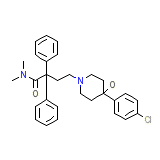Control




Control Brand names, Control Analogs
Control Brand Names Mixture
- No information avaliable
Control Chemical_Formula
C29H33ClN2O2
Control RX_link
http://www.rxlist.com/cgi/generic3/loperamide.htm
Control fda sheet
Control msds (material safety sheet)
Control Synthesis Reference
No information avaliable
Control Molecular Weight
477.037 g/mol
Control Melting Point
228 oC
Control H2O Solubility
Slight
Control State
Solid
Control LogP
6.249
Control Dosage Forms
Capsule; Liquid; Tablet
Control Indication
For the control and symptomatic relief of acute nonspecific diarrhea and of chronic diarrhea associated with inflammatory bowel disease or gastroenteritis. Also used for reducing the volume of discharge from ileostomies.
Control Pharmacology
Loperamide is a synthetic anti-diarrheal indicated for the control and symptomatic relief of acute nonspecific diarrhea and of chronic diarrhea associated with inflammatory bowel disease. Loperamide is also indicated for reducing the volume of discharge from ileostomies. In man, Loperamide prolongs the transit time of the intestinal contents. It reduces the daily fecal volume, increases the viscosity and bulk density, and diminishes the loss of fluid and electrolytes. Tolerance to the antidiarrheal effect has not been observed. Loperamide is an opioid receptor agonist and acts on the mu opioid receptors in the myenteric plexus large intestines; it does not affect the central nervous system like other opioids. It works specifically by decreasing the activity of the myenteric plexus which decreases the motility of the circular and longitudinal smooth muscles of the intestinal wall. This increases the amount of time substances stay in the intestine, allowing for more water to be absorbed out of the fecal matter. Loperamide also decreases colonic mass movements and suppresses the gastrocolic reflex.
Control Absorption
Not significantly absorbed from the gut
Control side effects and Toxicity
Oral, mouse: LD50 = 105 mg/kg. Symptoms of overdose include constipation, drowsiness, lethargy, and nausea.
Control Patient Information
Patients should be advised to check with their physician if their diarrhea does not improve after a couple of days or if they note blood in their stools or develop a fever.
Control Organisms Affected
Humans and other mammals














